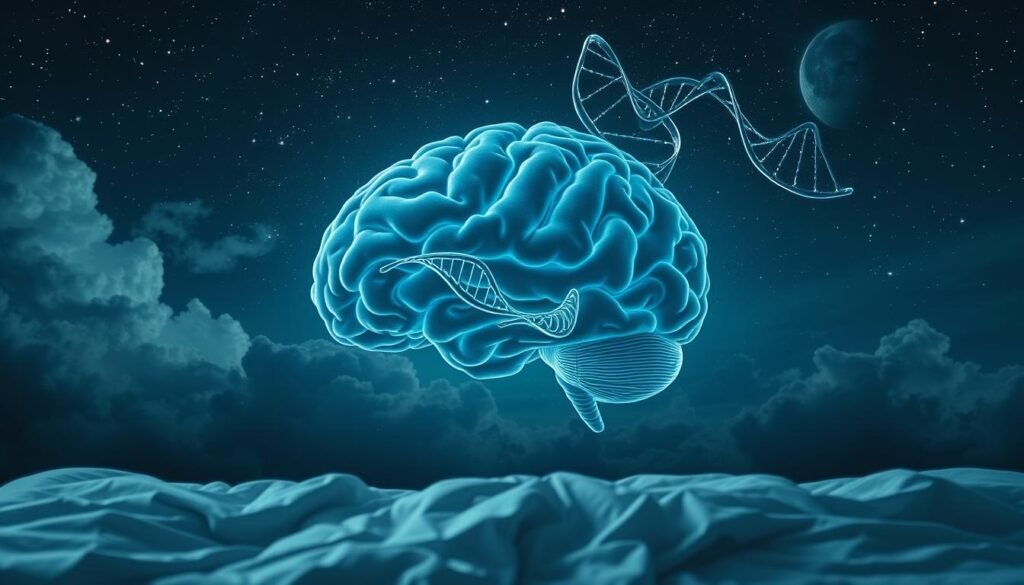Genetic factors play a big role in sleep problems in kids aged 8 to 10. This shows genetics are important in sleep disorders, like insomnia. Many people are dealing with sleep troubles more than ever. It’s important to know why this happens. Studies show that insomnia might run in families, and genes could be a major reason why. The link between genetics and sleep disorders makes us ask if insomnia can be inherited. We’ll look into how family history affects how we sleep in this article.
Key Takeaways
- Genetics play a key role in insomnia, especially in teenagers.
- Knowing your family’s health history helps in understanding sleep disorders.
- Our sleep cycles are controlled by specific genes.
- About 40% to 60% of people with restless legs syndrome have it in their family.
- Learning about insomnia’s genetic sides can help find better treatments.
Understanding Insomnia and Its Types
Insomnia is a big problem when it comes to sleeping well. It makes starting or staying asleep hard, leaving you tired during the day. There are many types of insomnia, each with its own set of problems. Knowing about these can help solve the problem.
Definition of Insomnia
Insomnia means having trouble getting to sleep or staying asleep. It leads to feeling tired and not doing well during the day. Insomnia is either short-term or long-lasting, based on how often it happens.
Different Types of Insomnia
There are various kinds of insomnia, such as:
- Acute Insomnia: This is short, from one night to a few weeks. Stress or events in life can cause it.
- Chronic Insomnia: Happening at least three nights a week for three months or more, often due to health problems.
- Sleep-Onset Insomnia: Trouble falling asleep when you first go to bed.
- Sleep-Maintenance Insomnia: Waking up often or too early and not being able to sleep again.
- Mixed Insomnia: Having both trouble falling asleep and staying asleep.
- Paradoxical Insomnia: Thinking you’re getting much less sleep than you actually are.
Prevalence of Insomnia in the General Population
About 30% to 35% of people say they have trouble sleeping. Women and older adults often have it more. If insomnia runs in your family, you might be more likely to have it. Up to 80% of people with a family history of insomnia deal with long-term issues. Knowing these facts helps us understand how our genes and surroundings affect sleeping problems.
| Type of Insomnia | Description | Duration |
|---|---|---|
| Acute Insomnia | Short-term, often due to stress or life changes | 1 night to a few weeks |
| Chronic Insomnia | Long-term, frequently connected with other issues | At least 3 nights a week for 3 months or more |
| Sleep-Onset Insomnia | Difficulty falling asleep | Variable |
| Sleep-Maintenance Insomnia | Trouble staying asleep | Variable |
| Mixed Insomnia | Combination of sleep-onset and sleep-maintenance issues | Variable |
| Paradoxical Insomnia | Underestimating actual sleep time | Variable |
What Are Sleep Disorders?
Sleep disorders disrupt normal sleep patterns. They vary in type and impact an individual’s life significantly. These conditions can drastically affect daily living and overall well-being.
Types of Sleep Disorders
- Insomnia: Problems with falling or staying asleep, affecting a large part of the population.
- Sleep Apnea: Pauses in breathing during sleep, often related to obesity and health issues.
- Narcolepsy: Excessive sleepiness and sudden sleep during the day, common in some families.
- Restless Leg Syndrome: The need to move the legs, causing discomfort and sleep problems.
- Circadian Rhythm Disorders: Misalignment between our internal clock and the outside world.
Impact of Sleep Disorders on Daily Life
Sleep disorders do more than just affect sleep. They lower cognitive abilities and increase anxiety. These conditions strain relationships and performance at work. Over 50 million adults in the US suffer from sleep disorders. This highlights its significance as a public health issue. Stress is also a contributing factor, with high stress linked to sleep problems in nearly half the affected individuals.

Is Sleep Insomnia Genetic?
Some people struggle with sleep more than others. Genetics play a role in why this happens. A mix of our genes and environment affects insomnia.
Research on Genetic Links to Insomnia
Studies show genetics are part of what causes insomnia. This is especially true when stress or sickness is involved. Families with insomnia history often have more sleep issues.
Research on twins has shown genes definitely affect sleep. Genome-wide association studies have found genes linked to insomnia. This helps us understand the disorder better.
Heritability Rates of Insomnia
Insomnia heritability is estimated to be between 0.21 and 0.44. This means genes influence sleep quality and duration. It explains why insomnia seems to run in families.
Twin studies help show how much genetics matter for insomnia. They prove looking into genetics could help solve insomnia mysteries.

| Study Type | Key Findings |
|---|---|
| Family Studies | Increased prevalence of insomnia among relatives of affected individuals. |
| Twin Studies | Heritability estimates range from 0.21 to 0.44 across sleep-related traits. |
| Genome-wide Association Studies | Identification of genetic markers linked to insomnia. |
Genetic Factors Associated with Insomnia
Understanding how our genes relate to insomnia gives us insight into sleep issues. Studies have found key genes impacting sleep patterns. This shows the role of genetics in developing insomnia, affecting sleep quality and consistency.
Key Genes Influencing Sleep Patterns
Research points to key genes in sleep control, especially those affecting brain chemicals like serotonin and GABA. These genetic differences might make some people more likely to have insomnia. The idea of testing genes for insomnia is gaining interest, leading to personalized treatment options.
Genetic Testing for Insomnia
Genetic testing for insomnia is a new area of study. Scientists want to find genetic signs that show a risk for insomnia. This could help doctors create treatments that match a person’s genetic profile.
Understanding Gene Expression Related to Sleep
How genes involved in sleep turn on and off is crucial. It affects the ability to fall and stay asleep. If these genes don’t work right, it may not just hurt sleep quality. It could also change overall health.

Insomnia and Family History
Family history is key in understanding sleep disorders like insomnia. Studies show many with insomnia also have relatives with it. This link stresses the need to consider family history when assessing sleep disorder risks.
Role of Family History in Sleep Disorders
About 34.9% of those with insomnia have a close relative who also had it. The mother is often this relative, reported by 19.7% of people. Those with insomnia are more likely to have a family history of the disorder. This is shown by 39.1% of insomniacs having a relative with insomnia, compared to 29.0% of good sleepers.
Comparative Studies on Insomnia in Families
Studies on twins show how insomnia might run in families. Twins show different sleep patterns, hinting at genetic factors. Those with a family history of insomnia often feel more anxious and have severe insomnia.
Genetic factors increase the risk of developing insomnia. This affects sleep quality and how long we sleep. Insomnia is also linked to mental health issues like anxiety and depression. These findings urge further research into how genetics influence sleep disorders.
Identifying Insomnia Risk Factors
Understanding what causes insomnia means looking at both our environment and our genes. There are many factors that can trigger or worsen insomnia. These include how we live and our family history. Knowing how all these elements interact helps us understand insomnia better.
Common Risk Factors for Developing Insomnia
Insomnia can be caused by several factors that vary from person to person. Key elements include:
- Stress: High stress can mess up how we sleep.
- Age: Getting older can change our sleep patterns.
- Mental Health Conditions: Issues like depression and anxiety can make insomnia worse.
- Medications: Some drugs can harm how well we sleep.
- Substance Use: Drinking coffee, alcohol, and smoking can hurt our sleep.
Environmental vs Genetic Influences
Different things around us and our genes both play a big part in insomnia. Studies found that genes account for up to 59% of the risk. Environmental factors include:
- Sensory Disruptions: Loud noises and bright lights make it hard to sleep.
- Sleep Hygiene Practices: Bad sleep habits impact sleep quality.
- Lifestyle Choices: How we exercise and what we eat matters for sleep.
Research shows our genes and what happens around us both affect how we sleep. For example, exercising and what we eat the day before can change our sleep. Knowing this can help us prevent or treat insomnia better.
| Risk Factor | Environmental Factors | Genetic Influences |
|---|---|---|
| Stress | High stress leads to sleep disruption. | Genetics may determine stress vulnerability. |
| Age | Older adults often experience sleep changes. | Heritability of insomnia may increase with age. |
| Mental Health Conditions | Conditions like anxiety impact sleep. | Genetic links exist between insomnia and mental disorders. |
| Medications | Some drugs induce sleep disturbances. | Genetic factors can affect drug metabolism. |
| Substance Use | Stimulants negatively affect sleep quality. | Genetic predisposition may determine substance sensitivity. |
Chronic Insomnia and Genetics
Chronic insomnia is a major health issue. It means having trouble sleeping at least three nights a week for three months or more. This problem can badly affect daily life and happiness. Knowing how genes and environment play a role is key to treat it well.
What is Chronic Insomnia?
About 10% of people in the United States struggle with chronic insomnia. It messes with their sleep a lot. People have trouble falling asleep, wake up often, or wake up too early. This can make daytime life hard. Genetics play a big part. Between 38% to 59% of insomnia risk comes from family history.
Gene Variants Linked to Chronic Insomnia
Studies with over 113,000 people have found gene variants that might make you more likely to have sleep problems. Scientists found three genetic areas and seven genes linked to insomnia. For example, the MEIS1 gene also connects to Restless Legs Syndrome, affecting 10% of folks in the U.S. Sunlight and other outside things can change how these genes work.
Age, gender, and health problems also affect insomnia risk. For instance, 33% of women and 24% of men over 50 have insomnia symptoms. Genes might explain why men and women have different insomnia rates.
| Factor | Impact on Insomnia |
|---|---|
| Age | Increased risk, especially in those over 50 |
| Gender | Higher prevalence in females |
| Mental Health Disorders | Exacerbates insomnia symptoms |
| Shift Work | Disrupts natural sleep patterns |
| Genetics | Influences likelihood of developing insomnia |
Understanding the genes related to chronic insomnia helps in creating personalized treatments. Using info about specific gene variants can lead to new therapies. These could better meet the needs of those dealing with this challenging condition.
Management and Treatment Options for Insomnia
To address insomnia, we start with behavioral therapies. These therapies look into the habits that affect sleep. They use different techniques to improve sleep management.
Behavioral Therapies
One main way to treat insomnia is through Cognitive Behavioral Therapy for Insomnia (CBT-I). It helps people change their thoughts and actions that hurt their sleep. CBT-I uses special techniques to make long-term sleep better and is often chosen before medication.
Medical Treatments Available
There are also medicine options for those needing extra help. Instead of the old benzodiazepines, now we have drugs like eszopiclone, zolpidem, and zaleplon. These are safer and less likely to cause addiction. They work well over time without losing effect.
Newer drugs, like orexin receptor antagonists suvorexant (Belsomra) and lemborexant (Dayvigo), are approved by the FDA. They can help people fall asleep or stay asleep, offering personalized insomnia treatment.
Preventative Measures for Insomnia
Preventing insomnia is about healthy sleep habits. Advice usually covers:
- Having a consistent sleep schedule
- Engaging in regular physical activity
- Reducing caffeine and alcohol intake
- Creating a calming bedtime routine
Making these lifestyle changes can make your sleep environment better. It greatly improves your chance of beating insomnia. For more treatment options, click here.
Conclusion
Insomnia and genetics have a complex relationship that calls for more research. Studies say 43% to 55% of insomnia cases come from genetics. This shows genetics is important, especially with certain sleep issues.
People with insomnia need a full plan that considers genes and habits. Genetic tests help know your risk. But, it’s key to find strategies that fit you. Cognitive Behavioral Therapy for Insomnia (CBT-I) is a top choice for many, doing better than drugs over time.
To deal with insomnia’s complex nature, people should look for solutions that address both genetics and lifestyle. As research and awareness grow, there’s hope for better understanding and treatments. This means aiming for healthier sleep for all.